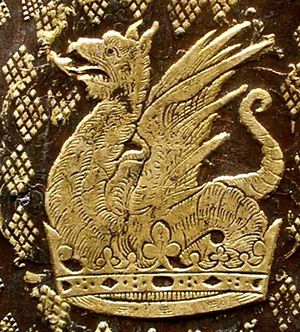Difference between revisions of "Anne Clifford 1590-1676"
| Line 26: | Line 26: | ||
[[Category:Aristocracy]] | [[Category:Aristocracy]] | ||
| + | [[Category:Countesses]] | ||
[[Category:Women]] | [[Category:Women]] | ||
[[Category:Armorial Stamps]] | [[Category:Armorial Stamps]] | ||
[[Category:All Owners]] | [[Category:All Owners]] | ||
Revision as of 22:58, 13 August 2020
Anne CLIFFORD, Countess of Pembroke 1590-1676
Biographical Note
Born at Skipton Castle, Yorkshire, daughter of George Clifford, 3rd Earl of Cumberland. She was well educated by her mother and home tutors (including the author Samuel Daniel) and developed her wide range of knowledge and intellectual interests throughout her life. In 1609 she married Richard Sackville, 3rd Earl of Dorset, but the marriage became unhappy, partly through ongoing litigation around the estate settlement left by her father in 1605. She became more independent, and wealthy, after Sackville's death in 1624, and wealthier still after marrying Philip Herbert, 4th Earl of Pembroke in 1630. Ongoing personal and property disputes meant that they spent little time together, and on his death in 1650 she added to her estates. During the middle decades of the century, much of her time was spent on defending and arguing estate claims, and also on building or repairing castles, houses and churches. She "spent the last 20 years of her life as a grand lady", running a household which was "in the best sense of the term, baronial" (ODNB).
Books
Surviving evidence of her reading has made Clifford one of the best-known and documented aristocratic lady book owners of the time; she inherited books from her mother, added to them, and created (in the words of her steward George Sedgewick) "a library stored with very choice books, which she read over, not cursorily, but with judgement and observation". Several books with her armorial stamps survive, and a number of her books contain her annotations or notes on dates of reading. Her library is famously pictorially represented in a painting of 1646; an attempt has been made to reconstruct its holdings, based on that (PLRE 277).
Sources
- British Armorial Bindings.
- Clifford, D. (ed), The diaries of Lady Anne Clifford, 1990.
- Hackel, H. B. Reading material in early modern England. Cambridge, 2005, 222-240.
- Harding, R. ‘Scraps of insignificant scribbling’: the Rev. Dr. Thomas Raffles and a lost book from the library of Lady Anne Clifford, Poetica 89 & 90 (2018), 123-38.
- Knight, L. Reading proof: or, problems and possibilities in the text life of Anne Clifford, in L. Knight et al (eds), Women’s bookscapes in early modern Britain, Ann Arbor, 2018, 253-73.
- Kuhta, Richard, “I beegane, to ovrloke this booke …”: Lady Anne Clifford’s copy of Titles of honor, in G. T. Tanselle (ed), Other people’s books, 2011, 42-45.
- Price, Leah, Lady Anne Clifford, Private Libraries in Renaissance England 9 (2017) 346-63.
- Purcell, M. The country house library. New Haven & London, 2017, 63.
- Spence, Richard T. "Clifford, Anne, countess of Pembroke, Dorset, and Montgomery (1590–1676), noblewoman and diarist." Oxford Dictionary of National Biography.
- Spence, R. Lady Anne Clifford, 1997.
- Anne Clifford, Catalogue of English Literary Manuscripts 1450-1700.
